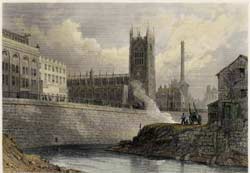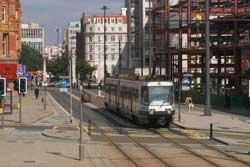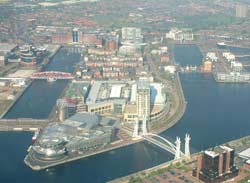Manchester
 Jeremy Bohl
Jeremy Bohl is a student from Oxford University. He studies Russian arid French. He's working now as an English teacher at the Municipal Nayanova University in Samara. Jeremy kindly agreed to tell us about his native city, Manchester, and answer our questions about the UK.
For most people Manchester is a city that conjures1 up many exciting images the birthplace of the Industrial revolution2 and the worlds first passenger railway station a thriving social and music scene and a world famous football team Manchester has a rich history and is today a captivating multicultural metropolis.
Manchester is set in the old county of Lancashire in the North-West of England next to the Penine hills which are also named the backbone3 of England.
Manchester began its life as a Roman fort in 79 AD4 called Mancunium5 and was a small and unimportant settlement until the 18th century when many textile factories sprang up and Manchester rapidly became an important trading city at the heart of the Industrial revolution. As a result of the Industrial revolution Manchester was a rich and proud Victorian6 city and many of the buildings in the centre reflect this period of prosperity. The town hall (a wonderful gothic building) the Manchester Art gallery and the Manchester library are but a few examples of its rapid growth during the 19th century.
 Manchester today is a city, which is still growing very quickly. Over the last ten years Manchester has changed enormously indeed each time I go back to my birthplace there are new buildings and I hardly recognize the place! The reason for this rapid change is the result of a bomb that the IRA7 planted8 in 1996 in the centre and is the biggest ever exploded on British soil (luckily nobody was killed). The bomb was so big that the only thing to have remained untouched on the street where it was detonated9 was a post box even the letters inside were eventually delivered10! Sadly however many buildings were severely damaged. Mancunians11 are not easily defeated12 though and are an ingenious and hardworking race13! Since the attack Manchester has been regenerated at an incredible pace14. Manchester is one of few cities in Britain to have a tram system (opened seven years ago) and many of the old Victorian warehouses in the centre have been converted into fashionable New York-style loft15 apartments. Take a stroll around the city and you will see dozens of new and impressive buildings such as the 'Urbis16' museum dedicated to the history of metropolises and 'The Shambles', a shopping complex Piccadilly Gardens situated in the heart of Manchester has also been regenerated recently and is a place where many young people meet during the summer to talk and play music.
Manchester today is a city, which is still growing very quickly. Over the last ten years Manchester has changed enormously indeed each time I go back to my birthplace there are new buildings and I hardly recognize the place! The reason for this rapid change is the result of a bomb that the IRA7 planted8 in 1996 in the centre and is the biggest ever exploded on British soil (luckily nobody was killed). The bomb was so big that the only thing to have remained untouched on the street where it was detonated9 was a post box even the letters inside were eventually delivered10! Sadly however many buildings were severely damaged. Mancunians11 are not easily defeated12 though and are an ingenious and hardworking race13! Since the attack Manchester has been regenerated at an incredible pace14. Manchester is one of few cities in Britain to have a tram system (opened seven years ago) and many of the old Victorian warehouses in the centre have been converted into fashionable New York-style loft15 apartments. Take a stroll around the city and you will see dozens of new and impressive buildings such as the 'Urbis16' museum dedicated to the history of metropolises and 'The Shambles', a shopping complex Piccadilly Gardens situated in the heart of Manchester has also been regenerated recently and is a place where many young people meet during the summer to talk and play music.
 Manchester is brimming17 with culture and music and many of its music halls and six theatres are well known throughout Britain. Manchester is home to two major classical music orchestras the Hallé18 and the BBC philharmonic. Both perform in the strikingly19 modern Bridgewater hall (named after a well known canal), which is renowned for its remarkable acoustics. Another modem cultural establishment in Manchester is the 'Lowry20' (named after a famous Mancunian artist), a centre for ballet, music and theatre. Both of these buildings were recently opened and are now landmarks21 of the city as a result of their spectacularly modem appearance. The breathtaking appearance of the Lowry in particular reflects the industrial past of Manchester as it has an enormous metal chimney22 at the front of the theatre! Another innovative and famous Mancunian theatre is the Royal Exchange theatre, situated in my favorite square in Manchester, St Anne's square. The Royal Exchange was, in the past, a cotton exchange23 where businessmen traded stocks and goods produced in Manchester. When Manchester's trading industry closed in the 20th century, the decision was taken to transform the building into a theatre and even the board with closing day trading prices has been preserved inside. The Royal Exchange is the only round theatre in Manchester and is one of the most prestigious in the country. Its unusual appearance and the light surroundings in the building have made it a popular place for young and old people to visit, relax and drink coffee.
Manchester is brimming17 with culture and music and many of its music halls and six theatres are well known throughout Britain. Manchester is home to two major classical music orchestras the Hallé18 and the BBC philharmonic. Both perform in the strikingly19 modern Bridgewater hall (named after a well known canal), which is renowned for its remarkable acoustics. Another modem cultural establishment in Manchester is the 'Lowry20' (named after a famous Mancunian artist), a centre for ballet, music and theatre. Both of these buildings were recently opened and are now landmarks21 of the city as a result of their spectacularly modem appearance. The breathtaking appearance of the Lowry in particular reflects the industrial past of Manchester as it has an enormous metal chimney22 at the front of the theatre! Another innovative and famous Mancunian theatre is the Royal Exchange theatre, situated in my favorite square in Manchester, St Anne's square. The Royal Exchange was, in the past, a cotton exchange23 where businessmen traded stocks and goods produced in Manchester. When Manchester's trading industry closed in the 20th century, the decision was taken to transform the building into a theatre and even the board with closing day trading prices has been preserved inside. The Royal Exchange is the only round theatre in Manchester and is one of the most prestigious in the country. Its unusual appearance and the light surroundings in the building have made it a popular place for young and old people to visit, relax and drink coffee.
 For most young people Manchester is a melting pot24 of music and social life. During the 1980s and 90s many Influential pop groups were born in Manchester and led to the period being named the 'Madchester years'. Famous British groups such as The Smiths, The Stone Roses, Joy Division, Simply Red, Happy Mondays, The Stranglers and most famously Oasis all grew up on the Manchester music and club scene. The combination of a large and lively student community (there are some 30 000 students in Manchester) and a bright and diverse club and youth culture in Manchester gave rise to these groups and many others. The city is awash25 with bars and dubs catering26 for every person's musical taste from techno, trip-hop and drum n' bass to salsa, rare groove and indie pop. Another reason for Manchester's energy is its multicultural atmosphere. Nationalities from all over the world live there (even Russians!) and there is a wide choice of restaurants from Mexican to French cuisine. Manchester is most famous, however for its Indian Cuisine and in a part of the city called Rusholme27 there is a mile long road where there are only Indian restaurants and is even named the 'curry mile'. It was In this area that I grew up and the lights, foreign smells and languages all around were extremely exciting for me as a young child and I return (here with pleasure every time I go home.
For most young people Manchester is a melting pot24 of music and social life. During the 1980s and 90s many Influential pop groups were born in Manchester and led to the period being named the 'Madchester years'. Famous British groups such as The Smiths, The Stone Roses, Joy Division, Simply Red, Happy Mondays, The Stranglers and most famously Oasis all grew up on the Manchester music and club scene. The combination of a large and lively student community (there are some 30 000 students in Manchester) and a bright and diverse club and youth culture in Manchester gave rise to these groups and many others. The city is awash25 with bars and dubs catering26 for every person's musical taste from techno, trip-hop and drum n' bass to salsa, rare groove and indie pop. Another reason for Manchester's energy is its multicultural atmosphere. Nationalities from all over the world live there (even Russians!) and there is a wide choice of restaurants from Mexican to French cuisine. Manchester is most famous, however for its Indian Cuisine and in a part of the city called Rusholme27 there is a mile long road where there are only Indian restaurants and is even named the 'curry mile'. It was In this area that I grew up and the lights, foreign smells and languages all around were extremely exciting for me as a young child and I return (here with pleasure every time I go home.
1 conjure up - вызывать в воображении
2 Industrial revolution - в XVIII - XIX вв. переход Великобритании, других стран Западной Европы и США в статус индустриальных держав
3 backbone - спинной хребет
4 AD - (anno Domini) нашей эры
5 Mancunium
6 Victorian - викторианский (относящийся к эпохе королевы Виктории 1837-1901 гг.)
7 IRA - (Irish Republican Army) террористическая организация ирландских националистов
8 plant - (зд.) закладывать
9 detonate - взрывать(ся)
10 deliver - разносить (почту т.д.)
11 Mancunian - 1. манчестерский 2. житель Манчестера
12 ...not easily defeated - ...не так легко сломить
13 race - (зд.) народ, племя
14 расе - темп
15 loft - (амер.) квартира, обустроенная в бывшем складе, цеху и т.д.
16 Urbis
17 brimming - полный
18 Hallé
19 strikingly - поразительно
20 Lowry
21 landmark - достопримечательность
22 chimney - труба (дымовая)
23 exchange - (зд.) биржа
24 melting pot - плавильный тигель
25 awash - (зд.) заполонен
26 cater for - удовлетворять
27 Rusholme
Читать еще в этой рубрике:
Читать еще в этом номере:
|











